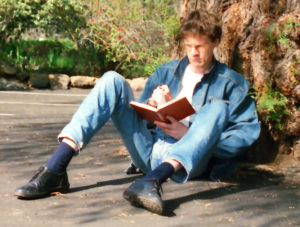When I was approaching retirement age five years ago, I felt an urge to take a closer look back on the last 65+ years, both my private life and my professional career.
To begin with, my aim was purely personal: I simply wanted to learn to know myself better (see → aims). But as I read through the piles of papers in my archive and began to write down the memories elicited by reading all this stuff, the contours of an emeritus research project emerged — one that might have some public interest as well.
I’m working on two tracks in parallell:
1) The first is quite straightforward: I’m producing a memoir, or rather autobiographical bits and pieces that will hopefully be assembled into a full memoir at some time in the future (see → versions of my memoir)
2) The second track is more academic in scope. It’s a demographic fact that the proportion of elderly people (senior citizens) in the population is steadily increasing in most parts of the world; so is the level of education and the proportion of people doing creative work of different kinds: writing books and articles, building start-up companies, making art, film and music, producing technologies and innovations, etc. As a consequence, the proportion of retired people who can look back on a life in production of oeuvres of different kinds, is growing rapidly.
In this project I focus on a subset of this group, namely former academic researchers, educators and scholars. People like me, who have been employed in universities for most of their life, but have left the career stage of their life behind and acquired emeritus status.
One of the issues that occupy the mind of many of us who have spent a major part of our lives producing creative works of one kind or the other is the meaning and legacy of our achievements (the life portfolio, the collected oeuvre). These achievements loom large in our retrospective awareness (we think we are what we produced), and it is probably for this reason many emeriti become engaged in memoir activities.
The scholarly aim of this project is to reflect on such memoir practices. How do members of ‘the retired creative class’ make sense of their careers and accumulated oeuvre? What role does the life vs. oeuvre play in these retrospective accounts? What kinds of memoirs do we write and what purposes do they serve?
Using my own life as an example, and drawing on my privileged access to documents, photos and memories from this life, my aim is to show how memoir writing can be a both pleasurable and meaningful emeritus activity, a means to a more fulfilling life and graceful ageing. A mental ‘care of self’ activity in anticipation of the inevitable physical and mental decline, and ultimately death, a supplement to the current public health focus on somatic wellness and healthy ageing.
Although I focus on the retired ‘creative class’, some of these reflections will hopefully be useful for broader segments of the ageing population as well.
The empirical basis for the project is my personal archive, interviews with old friends and colleagues, and my memories. I reflect on this rich material and read broadly in the literature on the genre of autobiography, memory, graceful ageing, socratic therapy and so forth.

 Sammanfattning på svenska:
Sammanfattning på svenska: